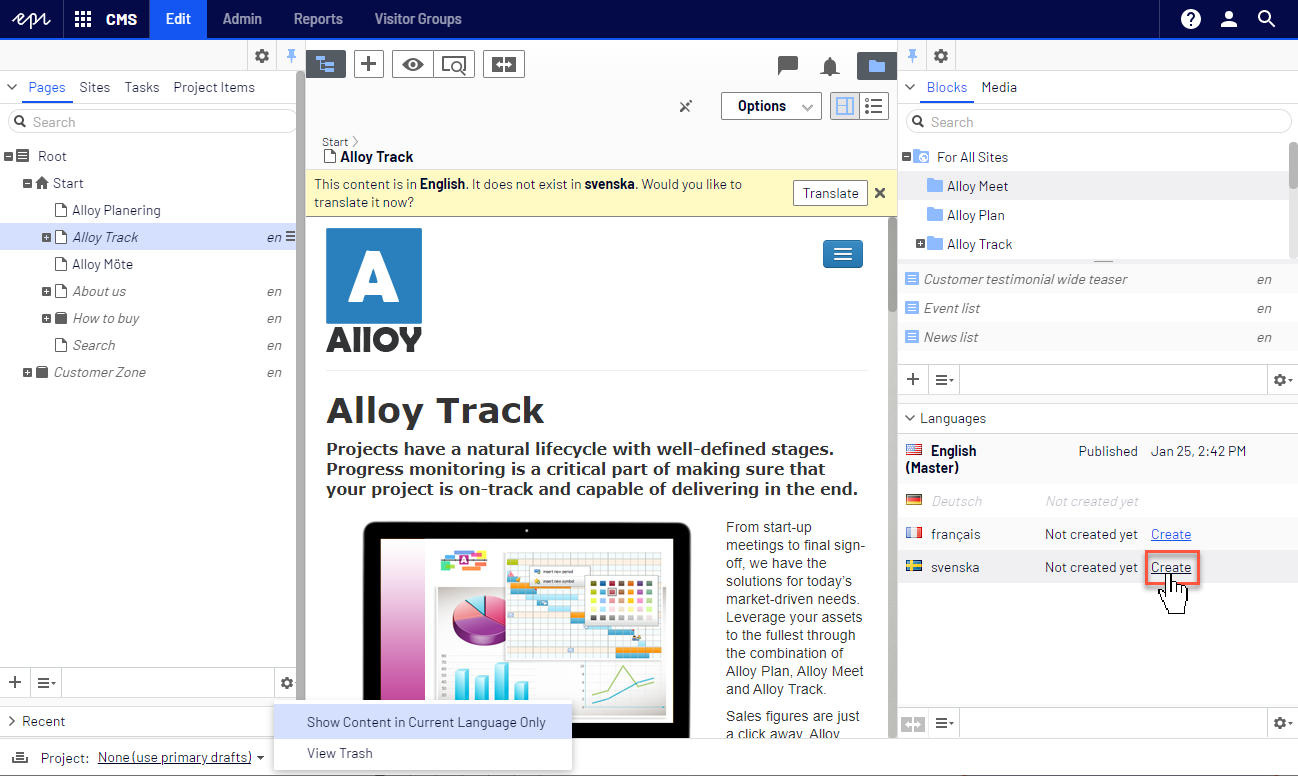Optimizely Languages
Describes Optimizely Languages, which provides easy access to a single interface for managing multiple languages and translations of content, with a built-in feature for managing automated translations.

Use Optimizely Languages to export and import XLIFF files that can be sent to in-house translators or localization agencies.
ITranslationPackageExporter and ITranslationPackageImporter are interfaces used for import and export of translation packages to a project. The default implementations are XLIFFTranslationPackageImporter and XLIFFTranslationPackageExporter.
Requirements
- No additional license fee.
- An Optimizely Content Management System (CMS) or Optimizely Customized Commerce installation.
- See Add-ons platform compatibility for package and version information.
Install
- Versions 7.5 and higher are installed through NuGet.
- Version 7 is installed and updated through one-click installation.
Documentation
- Developer guide:
- User guide Optimizely Languages
Configure auto-translation
This section describes configuring an auto-translation service for the Optimizely Languages app. Use Optimizely Languages as its translation provider Microsoft Translator, part of the Microsoft Cognitive Services collection of APIs, available in the Azure portal. The following steps show how to configure the auto-translate option.
Connect to the auto-translation service
- Subscribe to Azure, if you haven’t done so already.
- Configure the auto-translate component in Optimizely Languages.
- Go to admin view > Config > Tool Settings > Language Manager.
- In the Translator Provider, select Cognitive Service Translator.
- In the Subscription Key box, enter your Microsoft subscription key (Key 1).
- In Subscription Region, enter the Location value from the Azure subscription service.
- Save your changes.
See also: Reminder: Move Translator API subscriptions from DataMarket to Azure before April 30, 2017.
Breaking changes for Languages version 2
This topic describes API changes in version 2 of Episerver Languages.
NoteEpiserver Languages was renamed to Optimizely Languages.
Changed
Introduced new methods in the ILanguageBranchManager interface and its implementation, LanguageBranchManager. Compared with old methods, the difference is that the new method returns newly created content as an out parameter (createdContentLink):
bool CopyDataFromMasterBranch(ContentReference contentReference, string fromLanguageID,
string toLanguageID, Func<object, object> transformOnCopyingValue,
out ContentReference createdContentLink, bool autoPublish = false);
bool CreateLanguageBranch(ContentReference contentLink, string languageID,
out ContentReference createdContentLink);
bool TranslateAndCopyDataFromMasterBranch(ContentReference contentReference,
string fromLanguageID, string fromTwoLetterLanguageName, string toLanguageID,
string toTwoLetterLanguageName, out ContentReference createdContentLink,
bool autoPublish = false);Marked as obsolete
The following functions in ILanguageBranchManager and its default implementation LanguageBranchManager are obsolete and are removed in an upcoming release:
bool CopyDataFromMasterBranch(ContentReference contentReference, string fromLanguageID,
string toLanguageID, Func\<object, object> transformOnCopyingValue,
bool autoPublish = false);
bool CreateLanguageBranch(ContentReference contentLink, string languageID);
bool TranslateAndCopyDataFromMasterBranch(ContentReference contentReference,
string fromLanguageID, string fromTwoLetterLanguageName, string toLanguageID,
string toTwoLetterLanguageName, bool autoPublish = false);New dependencies
Languages 2.0 depends on newer packages: EPiServer.CMS.Core 9.8, EPiServer.CMS.UI 9.5.0
Updated 3 months ago
